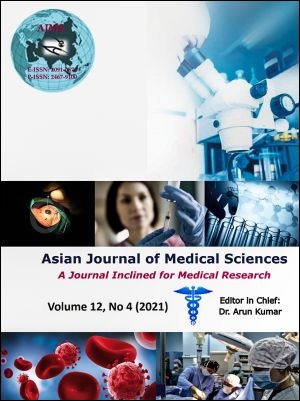Routine Nosocomial Infection Screening among Onco-Hematological Patients- Does It Change Management?
Keywords:
Extended spectrum beta lactamase, Methicillin Resistant Staphylococcus aureus, Multidrug resistance organisms, Nosocomial Infection, Onco-hematological patients, Septic episodeAbstract
Background: Hospital acquired infection (HAI) or Nosocomial Infection (NI) is a well-known entity among patients. The onco-hemological patients are immune-compromised and are at high risk of acquiring these infections. Routine screening of these patients for the presence of micro-organisms, their identification and sensitivity at the time of admission, and during stay, can help us in identifying infections and guiding therapy.
Aims and Objective: This study was undertaken to find out the role of routine screening of admitted patients in oncology ward with empirical therapy during neutropenic episodes. Nosocomial Infection Screening (NIS) test was performed for these patients. This test was done to detect Methicillin Resistant Staphylococcus Aureus (MRSA) and Extended Spectrum Beta Lactamases (ESBL) producing Gram Negatives. The NIS results obtained were correlated with organisms isolated from blood cultures.
Material and Methods: This retrospective study was done from period of May, 2013 to February,2017 in patients of oncology ward. Only those patients whose NIS test and blood culture was sent to the lab were included in the study.
Result: A Total number of 52 NIS tests and blood cultures were included in the study. Among 28 positive NIS samples, 19 samples correlated with blood cultures. Among 24 negative NIS sample 17 correlated with blood cultures. The p value was 0.017, PPV 73%, NPV 64%. SPSS software was used to calculated values.
Conclusion: This study showed that NIS test can be used as a tool for predictive marker for septic episodes in these patients.There is a higher probability of developing septic episodes with positive NISsamples.At the same time negative NIS result does not rule out infection.
Downloads
Downloads
Published
How to Cite
Issue
Section
License
Authors who publish with this journal agree to the following terms:
- The journal holds copyright and publishes the work under a Creative Commons CC-BY-NC license that permits use, distribution and reprduction in any medium, provided the original work is properly cited and is not used for commercial purposes. The journal should be recognised as the original publisher of this work.
- Authors are able to enter into separate, additional contractual arrangements for the non-exclusive distribution of the journal's published version of the work (e.g., post it to an institutional repository or publish it in a book), with an acknowledgement of its initial publication in this journal.
- Authors are permitted and encouraged to post their work online (e.g., in institutional repositories or on their website) prior to and during the submission process, as it can lead to productive exchanges, as well as earlier and greater citation of published work (See The Effect of Open Access).




